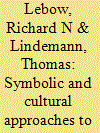| Srl | Item |
| 1 |
ID:
118423


|
|
|
|
|
| Publication |
2012.
|
| Summary/Abstract |
This paper outlines the operation of what may be called "political tourism" in China, and analyses the role of the sensorial technology of "seeing" in the kind of narrative this tourism engenders. Beginning in 1950, the newly established People's Republic of China launched an annual tradition of inviting non-communist elites to attend the May Day and the National Day (1 October) parades on Tiananmen Square in Beijing and in some metropolitan cities. Unlike contemporary ethnic tourism, wherein minorities and their cultures become the objects of the tourist gaze, Chinese political tourism aims at bringing minority leaders out of their putative "isolation", treating them with hospitality, and ultimately making them "see with their own eyes" China's "true face".
|
|
|
|
|
|
|
|
|
|
|
|
|
|
|
|
| 2 |
ID:
120739


|
|
|
|
|
| Publication |
2013.
|
| Summary/Abstract |
Who or what is a normative power? In response to this query the article suggests that normative powers are those actors that are recognized as such by others. This qualifies Ian Manners's oft-quoted proposition that normative powers are only those actors that have the ability to 'shape what can be "normal" in international life'. The proposition is that the definitions of the 'normal' are not merely undertaken by normative power, but they emerge in the context of its interaction with others. Recognition, in this setting, is indicated by the specific reactions of target states. In this respect, the issue is not merely about being and becoming a normative power, but also about being recognized as one by others. The article details this proposition through a parallel assessment of normative power Europe and normative power China. The intention of such comparison is to elicit the key elements of normative power in global life.
|
|
|
|
|
|
|
|
|
|
|
|
|
|
|
|
| 3 |
ID:
132919


|
|
|
|
|
| Publication |
2014.
|
| Summary/Abstract |
This forum offers a symbolic and cultural approach for understanding the outbreak of World War I that stresses the interactional and symbolic-cultural aspects of German decision makers' brinkmanship during the July crisis of 1914. Contrary to excessive structuralist accounts, the contributions focus on what actors 'do' and 'feel' during a crisis. In the German-Austrian case, symbolic interactions during the July crisis were strongly marked by challenges to the 'face' of decision makers. The second theme of the Forum is to question the purely 'material' nature of those structures traditionally referred to as permissive for World War I. Structures, in fact, are symbolic, too. Like theories on status discrepancy, the Forum stresses the impact of 'responsibility gaps'. However, the contributors also point to the emotional aspects and internal legitimacy problems caused precisely by those status lags.
|
|
|
|
|
|
|
|
|
|
|
|
|
|
|
|